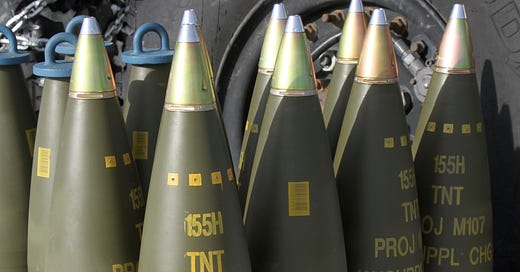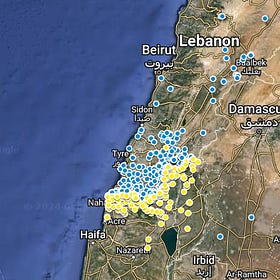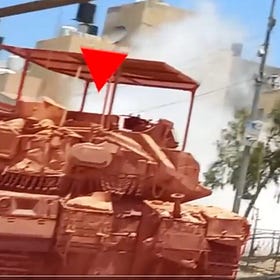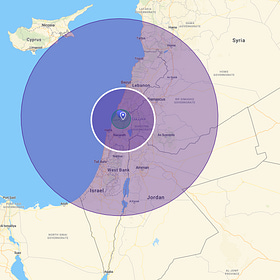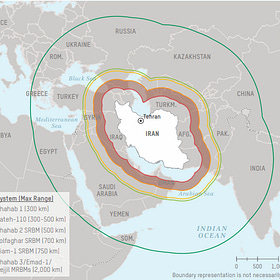Israel now stands ‘poised to invade’ Lebanon. In recent months Israel has leveraged its intelligence apparatus to carry out various operations bringing the region closer to a wider war. Despite israel’s recent successes I continue to have my doubts on its ability to wage & win a wider war, to understand why, I think it is important to look at supply demands on Western nations today.
Bullets cant fly without Supply
The oft laughed at POG mantra ‘Bullets can’t fly without supply’ is true, no matter how much my fellow grunts may rightfully mock the person saying it. In ‘America’s Waning Power’ I detailed both the depleted state of American munition reserves and the complete lack of manufacturing capacity to replenish those supplies.
Supply
155 Shells
When CSIS did their research (cited in the above mentioned article), the United States had a surge capacity up to 240,000 rounds per year. An recent Army publication (Feb 2024) states that the US was producing ~164,000 rounds annually & is now at 360,000 rounds annually (well above the previous surge capacity). The stated goal for the Army is 100,000 per month, or 1.2 million per year [1]. The rest of NATO is producing around 840,000 rounds annually [2].
Bombs
Information on bomb production wasn’t included in the CSIS report as we have apparently given relatively few to Ukraine. From 2010 to Dec 2023, we have given Israel 12489 JDAM kits and we produce ~10,500 a year with a surge rate of over 50,000 [3]. This is the guidance kits, not the explosive device.
For the explosive device itself, production numbers are harder to come by. This from the DOD, shows purchasing info across many systems. A 2022 article shows General Dynamics winning a contract worth $133.2 million to produce MK-80 series bombs[4]. At lets say (high end) $4,000 per bomb we are looking at upwards of 33,000 bombs per year.
Demand
Artillery
The above numbers are legitimately impressive given the earlier estimates, however, the demand has been equally impressive. Since the start of the Ukraine war the United States has sent over 3 million rounds to Ukraine, so at a replenish rate (ie supply minus demand) of 1 million per year, it would take 3 years to replenish our stockpiles.
Israel reportedly fired over 100,000 artillery shells in the first 2 months of their genocidal campaign (90,000 at Gaza & 10,000 at Hezbollah) [5]. Back in December 2023, The United States sent over 57,000 rounds to help replenish Israel’s stockpiles [6]. While their stockpile and munition information isn’t public knowledge, Haaretz is reporting that israel is relying on some ammunition manufactured in 1953 [7]. Perhaps they are using a FIFO (first in first out) strategy to deplete aging ammunition, but given the accompanying report of the increased failure rate and that it is almost twice as old as its suggested ‘shelf life’ might point to necessity of its use.
Bombs
In December, CNN reported that ‘nearly half’ of the bombs being dropped on Gaza were ‘dumb bombs’ ie, no guidance systems. By that time they had already used 29,000 air-to-ground munitions [8]. Israel reportedly drops an average of 300 bombs per day in Gaza, or over 100,000 bombs since the genocide began [9].
Competition
“When Ukraine was firing 10,000 shells per day, between 35 and 45 Ukrainian soldiers were killed daily and about 250 to 300 were wounded. But when the daily fire fell to half that, more than 100 Ukrainian soldiers were killed per day and at least a thousand were wounded.” — ‘A senior Ukrainian officer’ [10]
When we look at the demand for munitions in Ukraine, assume they need to match Russia roughly 1:1 on artillery, Russia is currently producing 250,000 shells per month, about 3 million per year. On the ground, CNN reports that while Russia is firing ~10,000 shells per day (3.6 million annually), Ukraine is only firing ~2,000 ( 730,000 rounds a year)[2] . As noted in the quote above, the rationing of artillery shells is having a devastating effect on Ukrainian troops.
Were Israel to be in a wider conflict that necessitate rationing of munitions, the casualty rate would presumably begin to increase as well.
Constraints
While Israel has a robust military industry, it relies heavily on others. Compounding the general supply & demand issues is legal challenges within ‘allied countries’. Germany (who is the 2nd largest supplier for israel after the US), the UK and the Netherlands have all suspended at least some of their exports to israel on concerns of human rights violations[11]. Even the United States temporarily halted shipments of JDAMs to israel, though recently the ‘sale’ has been approved [12].
US Elections
While both democrats and republicans display an unending willingness to betray America on behalf of israel. Trump & Vance have been supportive of ending the war in Ukraine which would largely alleviate the supply constraints detailed above. When I reviewed JD Vance I came to the conclusion, he wants to end the Ukraine war so he can better support israel. On the other side of that coin is their promise for ‘no new wars’ which could (hopefully) limit the direct involvement of the US.
While peace in Ukraine would free up NATO munitions, Russia will likely be eager to ‘return the favor’ by increasing their support of America’s adversaries throughout the world. Primarily, I think Iran and by proxy, all those Iran supports (Yemen, Hezbollah etc).
Capabilities
I do not think anyone would argue that israel is unskilled or incapable when it comes to intelligence operations, they have proven their prowess there. Additionally, with vast NATO support, their air operations are again difficult to challenge. On the ground is where the israelis are at their weakest. I am not going to delve too much into it because i did in other articles , but in short, conscripts fight like conscripts. As detailed in Double or Nothing israeli officials admit they cannot achieve their goals in Gaza, Hamas is still able to conduct operations and israel is still taking casualties.
I also detail in that article Hezbollah’s capabilities, and despite the death of Nasrallah, it seems improbable that Hezbollah would suddenly cease to function, more evidence of this comes in their continued strikes against israel. If they can muster command and control & have the stockpiles of weapons they are reported to have, Israel is going to be in for a bad time. Regardless, I believe a ground incursion would be catastrophic for Israel as I assume that is drilled and trained at the small unit level and less reliant on coordinated fire & control.
Restraint
For much of this conflict I have seen ‘the wisdom’ in restraint. The ‘resistance’ sought to undermine israel gradually enough to keep the United States mostly on the sidelines. We saw this in the telegraphed Iranian response, which i (wrongly) believed established deterrence. We saw it again on limited response to Beirut bombings, and we saw it in the lack of a response to the assassination of Ismail Haniya. I believe now that the ‘strategic value’ of such restraint is limited if not counter-productive. Israel is taking advantage of the restraint to inflict major damage to its adversaries and without established deterrence, it is doing so with impunity.
I wrote in ‘Israeli Escalations’ how I believe israel is seeking to start a wider war before US elections (so the next administration inherits the war), it seems they are willing to start the war with or without the resistance’s participation. With that information, Hezbollah remaining within the previously established ‘escalatory rules’ (ie hitting only northern ‘israel’) doesn’t appear logical. If looking for an idea of how much damage Hezbollah could inflict, i suggest you read ‘A Wider War : Hezbollah’.
From the Iranian perspective, Nasrallah seemingly played ‘by the rules’ with Israel (despite their repeated escalations) and they dropped a HUGE arsenal on him to kill him. What assurance is there for Iran or its leadership that israel will not behave the same way towards Iran? I think it is becoming harder to argue for restraint within Iran, if not impossible.
Conclusion
As israel relies primarily on its stand-off munitions to destroy & degrade its adversaries, supply chain issues are a significant risk to their ability to conduct operations. Given the challenges israel is facing with its ongoing genocide in Gaza, part of me wonders if this is more ‘bluff’ than true intent to invade and control parts of Lebanon. A key aspect for the continued survival of israel is its ability (primarily through intelligence & intimidation) to keep its adversaries ‘constrained’. The death of Nasrallah does not change any of the previously documented facts around the strategic, personnel and political challenges israel is facing (without a ground conflict in Lebanon).
Note: As I finished writing this, Iran began launching missiles towards Israel. Perhaps they came to a similar assessment on the value of restraint.
Related Articles
America's Waning Power
The dollar is weakening, its grip as a reserve currency eroding. The backing of the dollar, the ‘mighty’ US military is showing signs of weakness. Our foreign policy decisions have further isolated America yet there is little sign they will change. The various pieces below make up what I see as the foundation of American power (Money, Manufacturing, Wea…
American Victory
“A passionate attachment of one nation for another produces a variety of evils…And it gives ambitious, corrupted or deluded citizens (who devote themselves to the favorite nation) facility to betray or sacrifice the interests of their own country without Odium, sometimes even with popularity…”
Israeli Escalations
In the past day Israel has crossed multiple, MAJOR red lines. First they bombed Beirut, reportedly assassinating a Hezbollah leader (still not confirmed). Then they assassinated Ismail Haniyeh (the political leader of Hamas), perhaps more significantly, they did so inside of Tehran.
Double or Nothing
“Hamas is an idea. Anyone who thinks we can eliminate Hamas is wrong," —IDF Rear Adm. Daniel Hagari
A Wider War: Hezbollah
Israeli leaders are currently posturing for and threatening a wider war by invading Lebanon. I have heard several people state that Hezbollah ‘could flatten’ Tel Aviv. I have heard it enough that I wanted to take a look at the potential damage that Hezbollah could inflict upon israel. I researched the weaponry available to Hezbollah & used it to create…
A Wider War: Iran
As Israeli provocations seem to be dragging the world into war, I initially thought to jump straight into a piece on a world war. In the hopes we don’t get there, I am writing instead on the military capabilities of Iran. I think most Americans have lost sight of the reality that it is MUCH harder to project (ie invade) another country than it is to def…
Resources
https://finance.yahoo.com/news/general-dynamics-gd-wins-133-125012071.html
https://www.jpost.com/israel-news/defense-news/article-775523
https://www.dsca.mil/press-media/major-arms-sales/israel-155mm-artillery-ammunition
https://www.cnn.com/2023/12/13/politics/intelligence-assessment-dumb-bombs-israel-gaza/index.html
https://www.reuters.com/investigates/special-report/ukraine-crisis-artillery/


